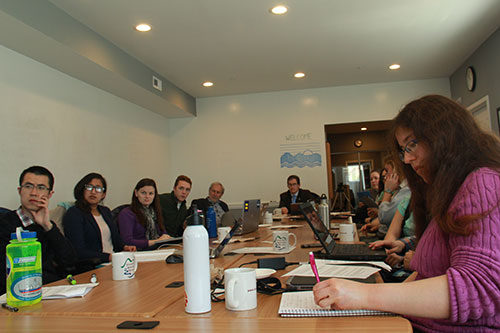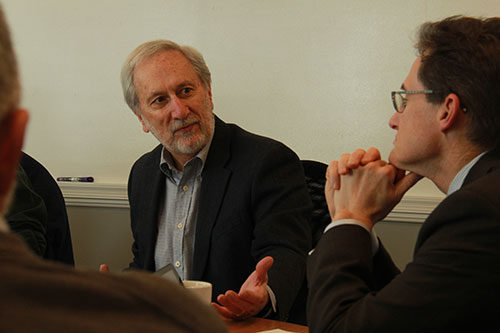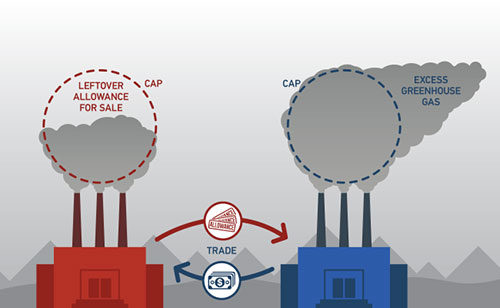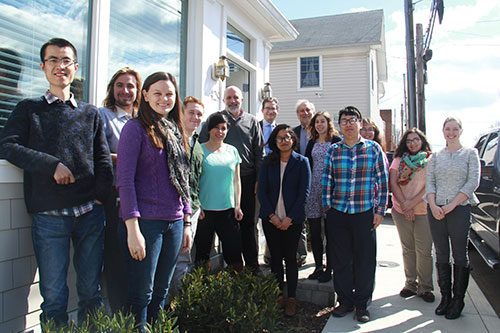Rapport over Reports: Next-Generation Science Communicators Learn from Policy Experts on the Front Lines
Ginni La Rosa, Katie Martin · | Science Communication | 8 commentsGinni La Rosa and Katie Martin
Last Friday, February 3rd, UMCES students in the Science for Environmental Management class from multiple campuses across the state gathered together at the IAN synthesis office in Annapolis to speak with two experienced practitioners on the frontier of science and policy decisions. Ben Grumbles was confirmed as Secretary of the Maryland Department of the Environment by the Maryland State Senate two years ago, after nomination by Governor Larry Hogan. He had previously served as Senior Staff Member of the Science Committee of the US House of Representatives and as Assistant Administrator for Water at the US Environmental Protection Agency, among other notable appointments. Also speaking with the class was Charles Fox, who is also a former Assistant Administrator for Water with the US Environmental Protection Agency, as well as former Secretary of the Maryland Department of Natural Resources. He is currently Program Director of the Oceans 5 philanthropy grant program.

Discussion ranged from international to state-level environmental policy actions and ideas. Charles Fox explained to the group that, contrary to concerns that scientists may not always be taken seriously by policy makers, scientists in fact play a fundamental role in policy by providing real numbers and ranges for often vague legislative terms. For example, executives turn to scientists for clear definitions of ‘safe’ drinking water and for distinct pollutant limits for the Clean Water Act and the Clean Air Act. When scientists are trained for effective communication with policymakers, they gain a high level of respect and credibility. In turn, politicians must understand how science differs from policy, particularly in terms of each field’s approach to uncertainty.
Fox also emphasized the need for more interdisciplinary forums for scientists to engage in policy discussions. From such dialogues, scientists can learn the best ways to make information accessible to decision makers as honest brokers. He described his own involvement in designing policy to remove phosphates in detergents to reduce nutrient runoff into the Bay and other water bodies. Through communication with researchers he learned that phosphates do not significantly improve detergents’ cleaning power, meaning they could be taken out of the formula without noticeably affecting product performance. Policy makers are faced with severe time constraints; they rarely can afford to read through technical materials on a given day. Thus scientists must be able to produce concise information and concrete recommendations that enable decision makers to clearly interpret the course of action needed.

An ongoing current issue in Maryland is the implementation of best available technologies (shortened as BATs) for newly-installed septic systems to reduce nutrient input to the Chesapeake Bay. In response to some constituent opposition, a compromise was agreed upon to require BATs within a ‘critical zone’ of the watershed, while allowing counties outside the zone to decide what they deem necessary. Secretary Grumbles highlighted this case study as an example of trade-offs that must occur in order to effect change in a net positive direction. He envisions a watershed management approach in which stakeholders can engage in shared governance rather than sole reliance on top-down government regulatory methods.
Finding reliable and adequate funding sources remains one of the most persistent constraints in environmental project planning. The Oceans 5 program relies on private philanthropy for establishing marine protected areas and other initiatives. In other cases, public programs may be supported by federal funds. Grumbles addressed the Chesapeake Bay watershed’s nutrient pollution issue with several current and potential policies. One common source of revenue is through tax-based programs such as the Bay Restoration Fund, colloquially known as the “flush tax.” This tax is collected from local governments and invested back into Bay restoration activities. Fox, in contrast, advocated the implementation of regulations at the level of the wastewater treatment plants, suggesting that such regulatory actions are likely more cost effective in the long run.
Alternatively, interest is building for a market for nutrient emission allowances that can be bought and sold by wastewater treatment industries and possibly agricultural entities. Industries that successfully reduce output below basic nutrient limitation requirements could use the credit as a source of revenue, creating incentive for further improvements. Such an emissions trading system has proven successful in reducing acid rain-causing sulfur dioxide release in the United States, and it is gaining momentum for greenhouse gas emissions as well. The proposed nutrient exchange plan has even been given the off-color nickname “crap-and-trade” by some in the spirit of the atmosphere-based system’s “cap-and-trade” moniker.

Recent reports suggest that severe funding cuts will be made to the US Environmental Protection Agency and many of its partner programs, particularly the Chesapeake Bay Program, a key driver in the Bay’s ongoing recovery. Proposed cuts may reduce the Chesapeake Bay Program’s funding from $73 million to as little as $5 million. Despite the apparent finality of the decision, Charles Fox reminded the group that the process of undoing regulation involves a regulatory process of its own, so time will tell what will actually occur.
Although an environmental issue may be a high priority from a scientist’s points of view, that issue may be a relatively low priority to a politician concerned with their constituents’ immediate demands. Building rapport with policy makers and relating environmental concerns to issues and values they care about are ways that environmental action can be brought to the forefront.
Last Friday’s conversations were visible proof that science and civility can (and must) coexist in the same room to enact the best environmental policies moving forward. Both parties share the responsibility of picturing the perspectives of one another and ensuring that ideas are not lost in translation, be they political or scientific jargon.
The meeting concluded on an encouraging note, inspiring students to continue advocating for sound science in management decisions, even in the midst of new challenges. Perhaps the main take-home message from the summit was the need for scientists to engage in conversations with practitioners rather than lectures at practitioners. Using a phrase coined by UMCES President Don Boesch, building a practice of ‘rapport over reports’ will make the best science communicators stand out from the rest and effect lasting change in environmental management.

To commemorate the eventful meeting, Dr. Bill Dennison composed the following poem:
The Practitioner Discussion
William C. Dennison
Our Science for Environmental Management class met in Eastport
So that our visitors Chuck Fox and Ben Grumbles could hold court.
Katie facilitated our discussion, slinging them good questions
And they provided our emerging scientists some good suggestions.
Ben and Chuck told us that communicating science was not a thing to fear
But warned us that facts are not enough to get people to hear.
We talked about nutrient trading and government regulations
And watershed governance and the environmental organizations.
And the role of private philanthropy for things like illegal fishing
MPAs as a way to protect Chesapeake oysters who are currently missing.
Crap and trade, political realities, finger pointing were touched upon
And nobody even had to stifle a yawn.
In the end, we got insights into the way these leaders think
And appreciate that what they said did not stink!
Next Post > On the trail of iconic Parisian scientists
Comments
-
Dylan Taillie 9 years ago
I thought this was a really awesome summary of the discussions we had last Friday. You gave a great mix of both background information and direct "pearls of wisdom" that the speakers dropped on us during class. The phrases 'rapport of reports' and 'civility' will stick with me, especially after your succinct summary. I also think it will be interesting to follow the nutrient trading changes during Grumbles time as Secretary of the Environment and see how that progresses as he was definitely a proponent. I will almost definitely come back and read this blog again.
-
Katie Martin 9 years ago
Ginni, It's impressive how much of the two hour discussion you managed to cover. I really like the cap-and-trade diagram showing trading credits for money. By showing "leftover allowance" it demonstrates how nutrient trading can create an incentive for cleaner practices and isn't simply "pollution trading". I'm also glad you included Charles Fox's "honest broker" comment (an ongoing theme).
-
Kavya Pradhan 9 years ago
Great job on the blog!
The point about having interdisciplinary forums for scientists is a very important one. And I think such a setup could be beneficial to both parties since it would give policy makers an opportunity to find experts in the field that can guide sound decision making and would give scientists access to decision makers. I also really appreciated that both Sec. Grumbles and Charles Fox stressed on the fact that policy making is a process that involves more than just science, but that science is integral to this process. -
Hadley McIntosh 9 years ago
Great job Ginni and Katie. Even though I was not able to attend the meeting, I feel like I got a lot out of the time you all met with them from this blog post. I am especially optimistic to hear that science was brought into the political decisions they have been involved with and that they expect it to continue being a part of the discussion in the future.
-
Ana Sosa 9 years ago
It was really interesting to realize that while they were giving us pointers on how to regulate our language when talking to different audiences, I could notice them choosing their words carefully, like they've been doing this for so long that they always consider who they're talking to before they decide how to say something. I wonder if we will also do that with time and a lot of practice.
-
Alterra Sanchez 9 years ago
Great work Ginni and Katie! Ginni, you did a wonderful job synthesizing a 2 hour discussion that, frankly, touched on just about everything! I appreciate that you included the comment from Grumbles that what scientists think does matter in the big picture, and the thought from Fox that the Chesapeake Bay program might not be doomed (hopefully the regulatory process helps us instead of hurts us for once!). As I'm sure a lot of us are feeling a little nervous and unsure (ok, may be a lot!) because of the current administration and the increasing anti-intellectual environment that it's creating, it was humbling and reassuring to hear veterans talk of hope for the future.
-
Jake Shaner 9 years ago
Very much enjoyed last Friday's discussion. I found it heartening that both of our guest speakers had a least a slightly less pessimistic outlook on the future of science funding. We are living in an interesting time in regards to scientific regulation and scientific advising, and it was nice to hear the perspective of two individuals who have lived through multiple administration changes. There are still ways to circumvent severe cuts, we might just need to think more creatively about directions for the future.
-
Juliet Nagel 9 years ago
As both Ginni and Alterra said, it was heartening to hear Charles Fox say that scientists are very respected and their input is valued. A main theme that ran throughout the discussion (and indeed, throughout our class thus far), is the need for better communication between scientists, policy makers, and stakeholders. One suggestion from Ben Grumbles that really struck me was that we should always take some time to sit down and think more about our audience than about our subject matter when communicating whatever scientific issue we are working on. Very wise words. Thank you so much to both Charles Fox and Ben Grumbles for giving time out of your busy schedules to meet with our graduate class!